Rhetoric, film, and screen studies offer an interdisciplinary approach to the study of human communication that focuses on the intersectional nature of meaning and knowledge.
Courses offered by the Department of Rhetoric, Film, and Screen Studies teach students to understand how citizens use the symbolic in processes of negotiation within democratic states. Historically, this understanding has come through study of oratory, writing, and debate. But as the public sphere has expanded, so have the skills needed for successful agency: skills also now address visual media such as film, television, and virtual worlds.
Courses examine the production of meaning in texts and screen texts through the study of the systems that create texts; the form of those texts; and the historical, sociocultural, and economic milieus that mediate their circulation and interpretation. Courses are informed by theories that examine race, ethnicity, gender, sexuality, and class, among other categories. In addition to introductory courses, students are required to take courses in performance. Students take two seminar courses with two different professors to further expand their exploration into the breadth of rhetoric, film, and screen studies. All students complete a senior thesis.
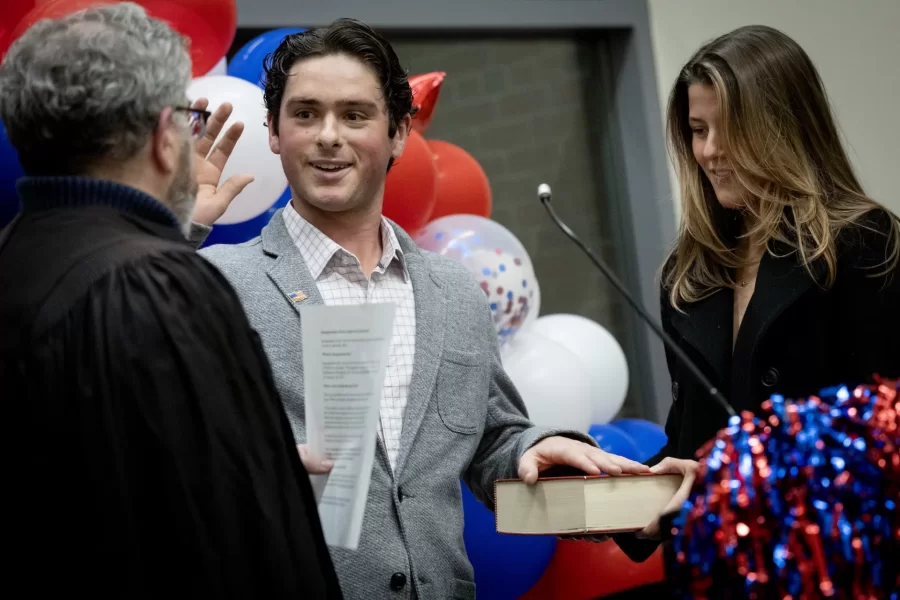
This year’s Presidential Campaign Rhetoric class had a ball—an inaugural ball, that is.
On Monday night on the second floor of Commons, “President-elect” Claire Bennett (played by Leah Belber ’26 of Washington, D.C.) officially became “President” Bennett after taking the oath of office administered by Professor of Politics Stephen Engel. Here, she is seen with her loving “husband,” John Bennett (played by George Wan ’25 of Hong Kong), who held a constitutional law textbook during the mock ceremony.
Among other scenes, swipe left to see Vice President Lawrence “Frank” Green (played by Freddie Curtis ’25 of Harvard, Mass.) take his oath of office alongside his “wife,” Elizabeth Green (played by Claire Bohmer ’25 of Steamboat Springs, Colo.). President Bennett also celebrates with her campaign manager, Katherine Moe ’25 of Washington, D.C.
Win or lose, members of the Presidential Campaign Rhetoric class and their friends toasted to a job well done with tasty treats and sparkling cider. Taught by Stephanie Kelley-Romano (@profskr), professor of rhetoric, film, and screen studies, the popular rhetoric course is affectionately known by its acronym “PCR.” It offers an intensive and immersive interdisciplinary experience, where mock campaigns run ads, deliver speeches, navigate scandals, and engage with “the media”—also staffed by PCR classmates.
Congratulations to both campaigns and the PCR media coverage from “The Political Times” for another successful and hard fought campaign season.
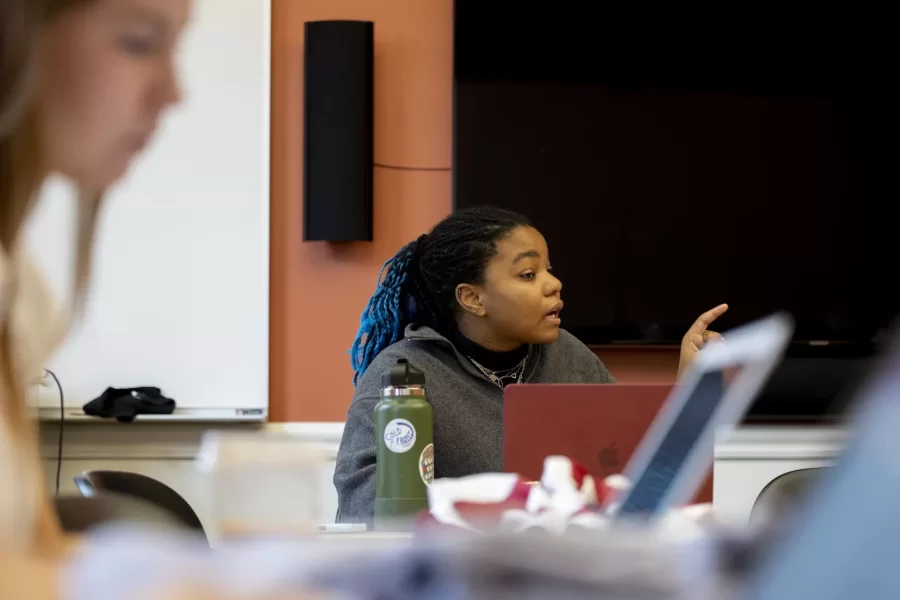
Yesterday, two presidential campaigns designed by Bates students faced a scandal, and each team had 90 short minutes in which to respond.
A blessedly mock campaign, it’s a component of “Presidential Campaign Rhetoric,” which Professor of Rhetoric, Film, and Screen Studies Stephanie Kelley-Romano has taught every couple of years since the early 2000s.
This year, Kelley-Romano asked each campaign to prepare two responses. “One where they have to address (minimize and justify) what went on and a second where they can totally deny it. At the end of the class period I will have another story for each campaign that shows the accusations were false and they are absolutely vindicated (these stories can then run in our fake newspaper without the danger of damaging the candidate images or campaigns). During the class there will also be other information that “breaks” that they will have to respond to
The course is a senior seminar, and part of its coursework is traditional. Students do readings and have discussions, getting a handle on the many rhetorical devices that presidential campaigns deploy in speeches, ads, debates, and social media, as well how the news media interprets all this political discourse.
Simultaneously, the students get to practice and hone their rhetorical skills during the mock campaign. Everyone in the class has a role, from doing social media and speechwriting to playing family members and news reporters.
For the first time, this year’s two campaigns will not be affiliated with either of the two major U.S. parties (nor with any other party, whether Greens, Libertarians, or even Whigs).
Getting rid of the labels, Kelley-Romano hopes, will make “voters,” the nearly 600 students who are in various courses that intersect with the campaign, “think twice about what they’re hearing.” While an overall goal of the mock campaign is to increase the quality of public discourse, it’s up to each campaign to “balance responsible discour
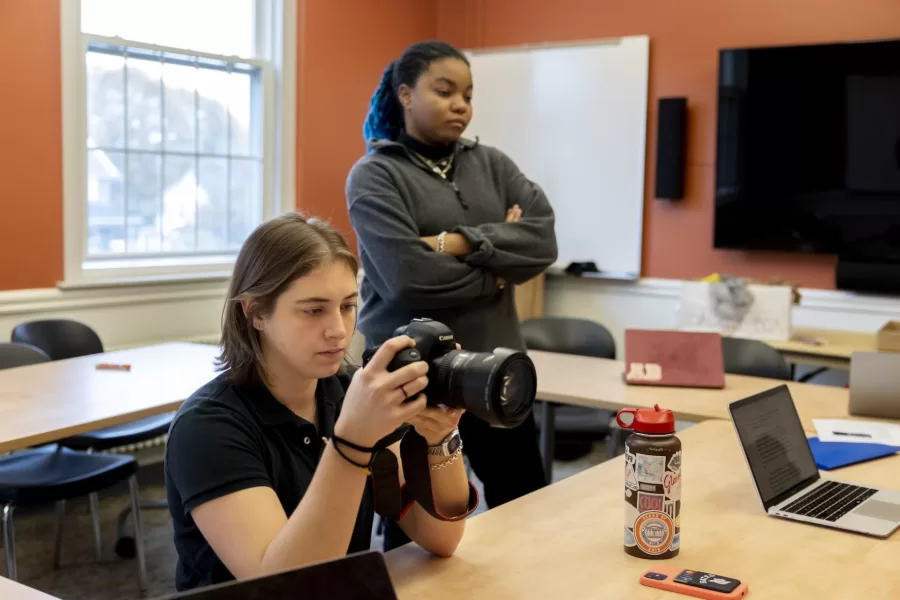
Yesterday, two presidential campaigns designed by Bates students faced a scandal, and each team had 90 short minutes in which to respond.
A blessedly mock campaign, it’s a component of “Presidential Campaign Rhetoric,” which Professor of Rhetoric, Film, and Screen Studies Stephanie Kelley-Romano has taught every couple of years since the early 2000s.
This year, Kelley-Romano asked each campaign to prepare two responses. “One where they have to address (minimize and justify) what went on and a second where they can totally deny it. At the end of the class period I will have another story for each campaign that shows the accusations were false and they are absolutely vindicated (these stories can then run in our fake newspaper without the danger of damaging the candidate images or campaigns). During the class there will also be other information that “breaks” that they will have to respond to
The course is a senior seminar, and part of its coursework is traditional. Students do readings and have discussions, getting a handle on the many rhetorical devices that presidential campaigns deploy in speeches, ads, debates, and social media, as well how the news media interprets all this political discourse.
Simultaneously, the students get to practice and hone their rhetorical skills during the mock campaign. Everyone in the class has a role, from doing social media and speechwriting to playing family members and news reporters.
For the first time, this year’s two campaigns will not be affiliated with either of the two major U.S. parties (nor with any other party, whether Greens, Libertarians, or even Whigs).
Getting rid of the labels, Kelley-Romano hopes, will make “voters,” the nearly 600 students who are in various courses that intersect with the campaign, “think twice about what they’re hearing.” While an overall goal of the mock campaign is to increase the quality of public discourse, it’s up to each campaign to “balance responsible discour
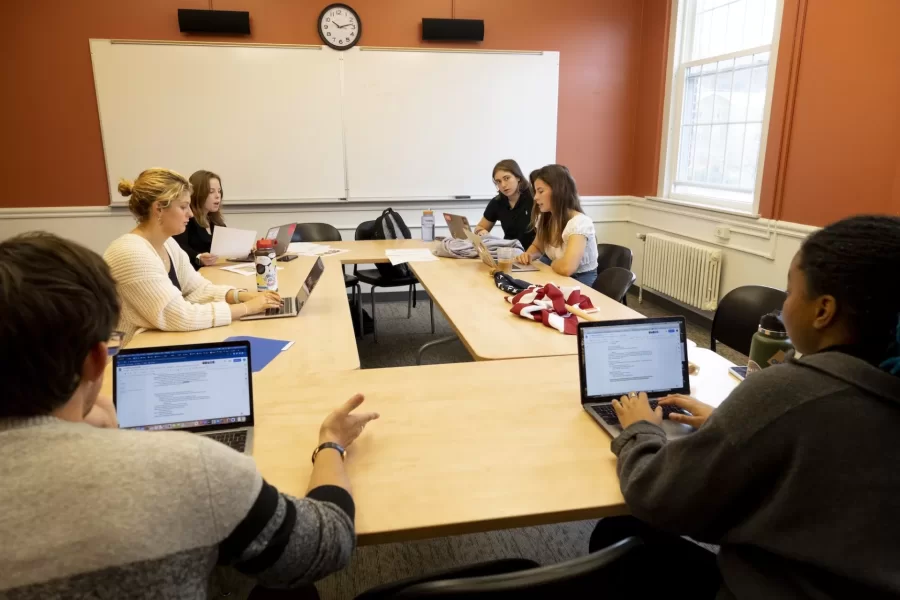
Yesterday, two presidential campaigns designed by Bates students faced a scandal, and each team had 90 short minutes in which to respond.
A blessedly mock campaign, it’s a component of “Presidential Campaign Rhetoric,” which Professor of Rhetoric, Film, and Screen Studies Stephanie Kelley-Romano has taught every couple of years since the early 2000s.
This year, Kelley-Romano asked each campaign to prepare two responses. “One where they have to address (minimize and justify) what went on and a second where they can totally deny it. At the end of the class period I will have another story for each campaign that shows the accusations were false and they are absolutely vindicated (these stories can then run in our fake newspaper without the danger of damaging the candidate images or campaigns). During the class there will also be other information that “breaks” that they will have to respond to
The course is a senior seminar, and part of its coursework is traditional. Students do readings and have discussions, getting a handle on the many rhetorical devices that presidential campaigns deploy in speeches, ads, debates, and social media, as well how the news media interprets all this political discourse.
Simultaneously, the students get to practice and hone their rhetorical skills during the mock campaign. Everyone in the class has a role, from doing social media and speechwriting to playing family members and news reporters.
For the first time, this year’s two campaigns will not be affiliated with either of the two major U.S. parties (nor with any other party, whether Greens, Libertarians, or even Whigs).
Getting rid of the labels, Kelley-Romano hopes, will make “voters,” the nearly 600 students who are in various courses that intersect with the campaign, “think twice about what they’re hearing.” While an overall goal of the mock campaign is to increase the quality of public discourse, it’s up to each campaign to “balance responsible discour
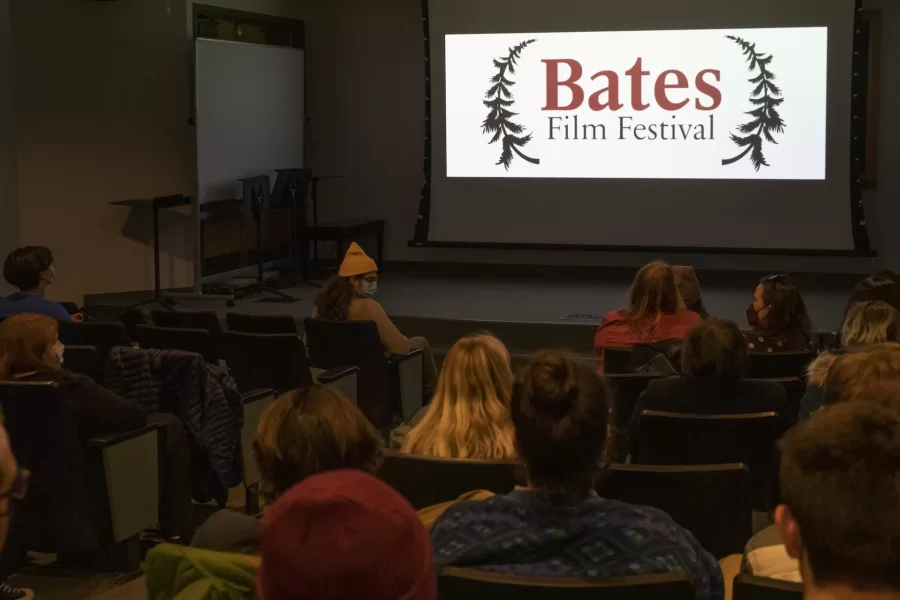
Opening night of the Bates Film Festival in Olin 104 with a screening of “The Worst Person in the World.”
Lights on the way back from Olin to Lane Hall.
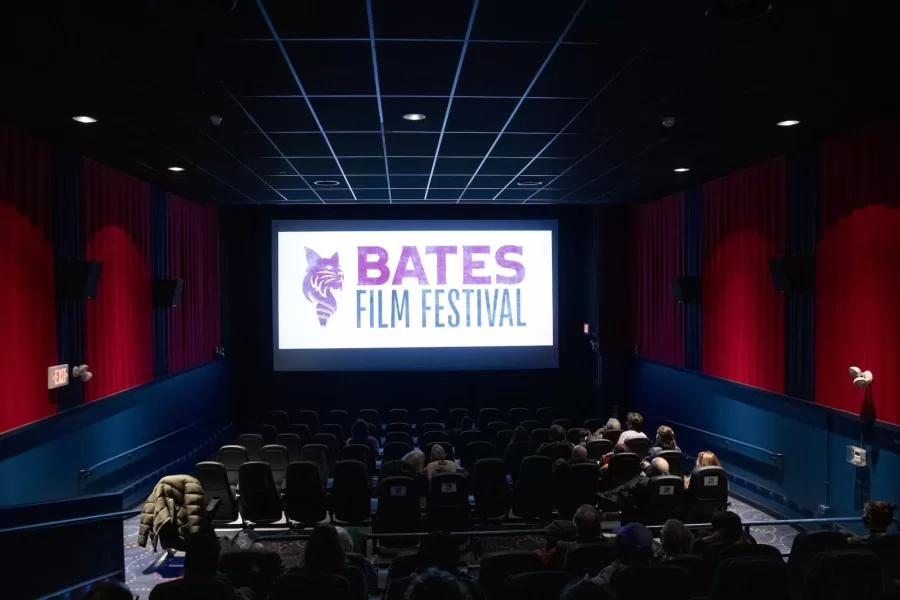
Bates Film Festival at the Nordica Theatre in Freeport Maine on Saturday, April 2,2022.
Inside theater for screening of “Memoria.”
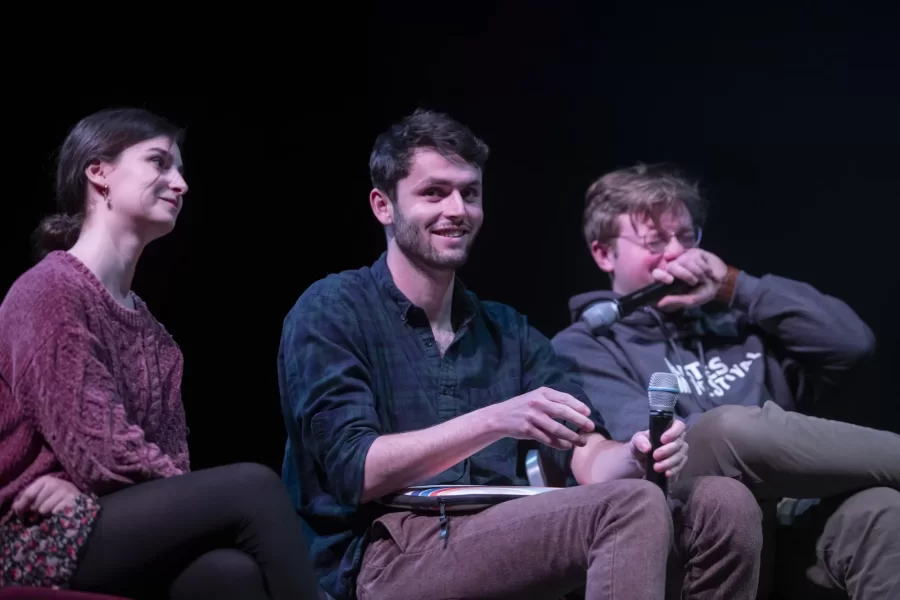
Bates Film Festival guests John Turturro and John Shea ’72 participate in two back to back Q&As in Schaeffer Theater. Turturro was from 2:30-4 p.m. Shea was from 4:30 to 6 p.m. Faculty members Jon Cavallero, Katalin Vecsey and Tim Dugan joined students from the Cavallero’s festival class to pose questions to the two actor/director/writers.
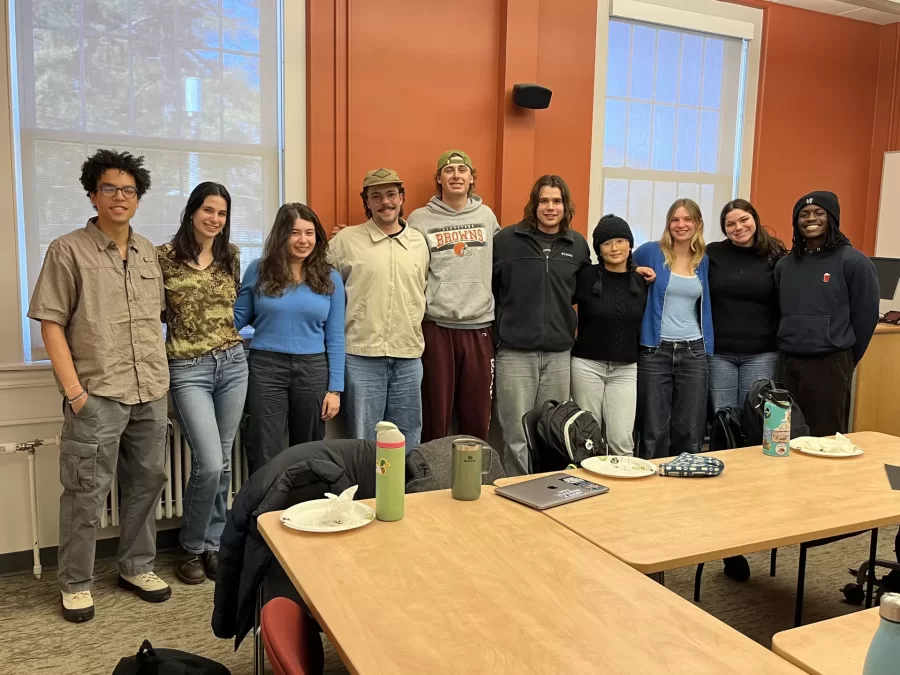
Winter 2025 Thesis Students at their thesis turn-in celebration!
Argumentation and debate are traditional aspects of the practice and study of rhetoric, and have long been considered essential elements to a functioning public sphere. Bates has a storied tradition of excellence in debate, and students may study argumentation in courses or participate in competitive debate, or both. The Brooks Quimby Debate Council (BQDC), teaches students basic elements of rhetorical practice and theory.








